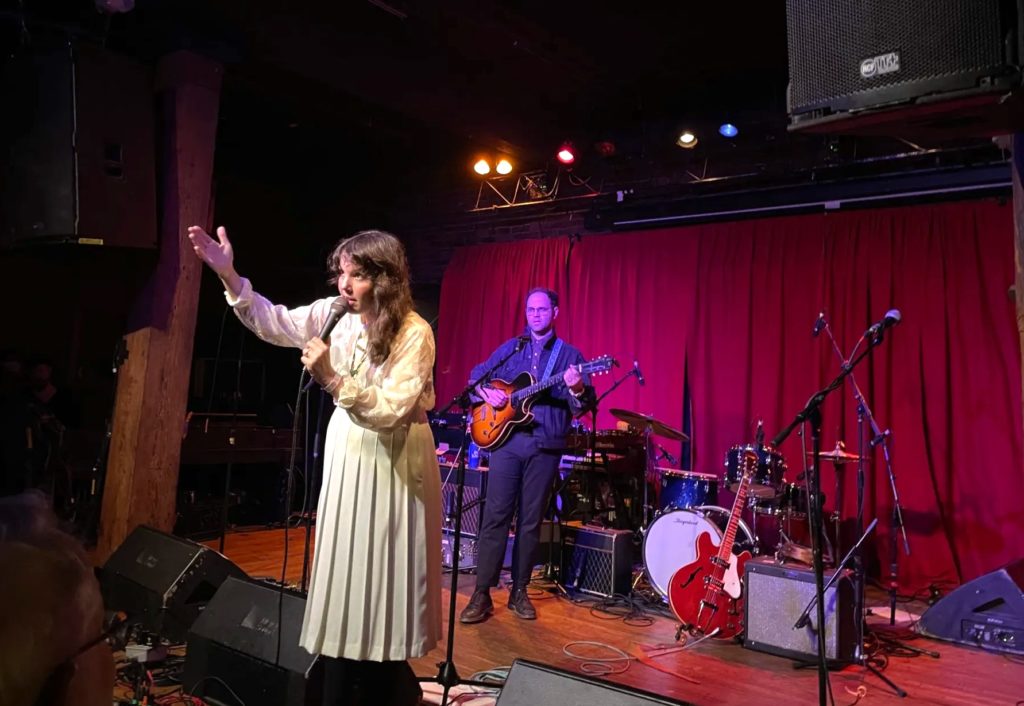
Nashville musician Tristen Gaspadarek stands on stage in front of an emotional crowd. It’s her last show at Mercy Lounge, and in between songs, she tells stories about the role this space has played in her journey as a musician.
First, she saw shows here. Then, she played shows here. She even met her husband and bandmate here, 15 years ago. The two are expecting a baby, and she rests her guitar on her bump while she speaks.
“Growth is not always progress, money is not meaning, and amenities are not culture,” she says, as the crowd cheers. “But we’re going to be alright – cause we’re just going to move out and out and out … and soon we’ll all be living in Alabama.”
For the last month or so, musicians like Tristen have been holding these farewell shows.
That’s because Mercy Lounge, and the other venues inside Cannery Row like The High Watt, are moving out.
The building was bought by a Nashville-based property management company, DZL, with another company for $32 million in 2019. DZL took sole ownership in 2020.
Mercy’s current operator, Todd Ohlhauser, says they couldn’t agree on a new lease to continue running the space.
Small, independent music venues across Nashville are facing this same fate. Operators usually don’t own the spaces they inhabit, so when the buildings are sold, the rents may rise and clubs are forced to move.
In this case, DZL plans to renovate, then reopen the venues under a new name later this summer.
“As the venues become corporatized, the opportunities for local, independent artists diminish rapidly,” says Chris Cobb, head of an independent venue association, Music Venue Alliance Nashville.
Cobb also runs Exit/In, which is also struggling to come to a lease agreement with its new owners. The venue 3rd & Lindsley is in the same position.
Cobb says a true independent venue takes risks on new talent – helping them build their careers before their shows are profitable. He doesn’t believe that bigger businesses like the new owners, DZL, will be as invested in doing that.
The company declined an interview, but in a statement, say they’re committed to preserving the space for local artists.
DZL has hired a general manager, Brent Hyams, whose background includes larger venues like the Ryman and the Opry.
“This is a legacy opportunity for me as someone who has both been a fan of the Cannery and worked within Nashville’s music industry,” Hyams say in a statement. “We all have great memories from these venues — we’re here to keep the unforgettable moments going and carry on a part of what makes Music City authentic and special.”
But Cobb isn’t buying it.
“If the concern were what was best for Mercy Lounge and what’s best for Nashville, then the operator who’s been there for 18 years — since the very beginning and founding of the venue — is obviously the best person for the job,” Cobb says of Mercy’s current operator, Todd Ohlhauser.
Too little, too late? Could Metro offer smaller venues a life raft?
While this trend of buildings getting sold out from under venue operators has been simmering in Nashville for a while now, it seems to be reaching a boiling point. Now, Nashville city government is taking notice.
“Government operates pretty slow,” admits council member Jeff Syracuse.
He points to two changes that could help smaller clubs.
One is the return of the defunct Music City Music Council, which was a volunteer board of industry professionals who work with city government to attract events and development deals.
The second is the city’s new Office of Music, Film and Entertainment, which would help keep film shoots or studio sessions in the area by making it easier to get permits.
Syracuse hopes these two groups will work together to come up with solutions to ease the pressures facing local venues — things like zoning classifications specifically for clubs, or assistance in finding affordable rents.
“If we don’t be a little more intentional and thoughtful about how we support working creatives in the city, we can lose it,” Syracuse says. “It’ll be a forced migration of small business owners, of working creatives, of individuals who can’t afford to live here anymore.”
It may be too late to keep Mercy Lounge in Cannery Row, he says. But new policies could protect future venues.
Clarification: A previous version of this story said that Tristen Gaspadarek was performing her last show at Mercy Lounge under the stage name Tristen. She is continuing to perform, just not at the soon-to-be-closed Mercy Lounge.

